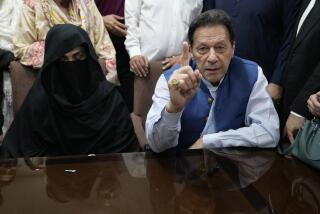Bashir Guilty in Bali Blasts, Acquitted of Most Charges
- Share via
JAKARTA, Indonesia — Militant cleric Abu Bakar Bashir, accused of heading the Jemaah Islamiah terrorist network, was found guilty today of taking part in an “evil conspiracy” to carry out the 2002 Bali nightclub bombings that killed 202 people.
But the five-judge panel cleared Bashir of most of the charges against him and sentenced him to 2 1/2 years, a relatively light sentence in recognition that the prosecution’s case was not very strong.
As police formed a cordon three deep across the auditorium where the trial was held, Bashir urged hundreds of disappointed supporters to remain calm and told the court that he would appeal.
“I reject the verdict,” he said. “This is a tyranny.”
Adnan Wirawan, one of dozens of attorneys representing Bashir, charged afterward that the verdict was politically motivated. “This is a verdict to please the politicians,” he said.
Prosecutors had charged that the white-bearded Bashir, 66, conspired to carry out terrorist bombings in Indonesia. They also alleged that he knew about plans for the Bali bombings and a 2003 attack on the J. W. Marriott Hotel in Jakarta, the capital, that killed 12, and did not try to stop them.
Bashir has consistently denied any role in terrorist activities or Jemaah Islamiah, which is responsible for a string of deadly blasts in Indonesia and the Philippines. The cleric contends that he is the victim of a plan by the Bush administration to silence him because he advocates adoption of strict Islamic law.
“My arrest, detention and trial was ordered by George Bush and his henchmen because of my struggle to uphold Islamic law in Indonesia,” he told the court in an earlier hearing. “The charges against me are not true. I never ordered other people to carry out the Bali bombings nor the J. W. Marriott bombing.”
Bashir’s claim of U.S. interference received support during the trial from a surprising source. Frederick Burks, who interpreted for President Bush during a 2002 meeting with then-President Megawati Sukarnoputri, testified in Bashir’s defense that a CIA envoy also present at the meeting urged the Indonesian government to “render” Bashir to the U.S. for removal to a third country.
“The special envoy asked for the cleric to be handed over to the United States,” Burks told the court. “The envoy emphasized that he was very, very wicked and must be detained.... In this case, the cleric was asked to be rendered, which I translated then as being secretly captured and handed over to the United States.”
Megawati declined to hand over Bashir, Burks testified.
Some of the most damaging evidence against Bashir came from Nasir Abbas, a former high-ranking member of Jemaah Islamiah.
He testified that Bashir led the Southeast Asia terrorist network and that he had been with Bashir when the cleric visited a Jemaah Islamiah training camp in the southern Philippines where recruits received training in bomb-making and combat. Bashir addressed the graduates and told them that military training was part of jihad, Abbas said.
During the visit to the Philippines, Abbas said, Bashir told him that he had once visited Al Qaeda leader Osama bin Laden in a cave in Afghanistan and that the conditions there were far worse than in the Philippine training camp.
Mohammed Rais, a former Jemaah Islamiah member who is serving seven years in prison for transporting explosives used in the Marriott bombing, testified that he carried a message to Bashir from Bin Laden in early 2001 saying that the Indonesian cleric was welcome in Afghanistan if he no longer felt safe in Indonesia.
Rais said the message had been given to him by Hambali, a high-ranking member of both Jemaah Islamiah and Al Qaeda and a longtime friend of Bashir who was arrested in 2003 and is being held by the U.S. at a secret location.
Bashir has been in jail since shortly after the Bali bombings, and the trial is his second on terrorism-related charges.
He was convicted of treason in 2003, but an appellate court overturned the verdict. He served 18 months for immigration violation and forgery. Upon his release from prison last April, he was immediately rearrested and charged with heading Jemaah Islamiah.
Bashir had been in prison for several months when the Marriott bombing occurred but had unrestricted access to a mobile phone and visitors during that time.
During the second trial, Bashir told the court that he opposed the bombing of targets in Indonesia.
“I could not have supported the Marriott and Bali bombings because they were committed in places of peace and not conflict zones,” Bashir said. “If the aim were to attack the interests of the United States, the country that has clearly violated and attacked Islam, they should have taken up arms in Afghanistan, Pakistan, the Philippines or other such places.”
More to Read
Sign up for Essential California
The most important California stories and recommendations in your inbox every morning.
You may occasionally receive promotional content from the Los Angeles Times.













